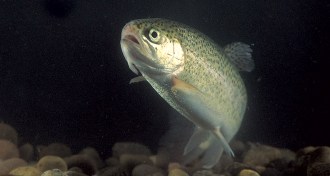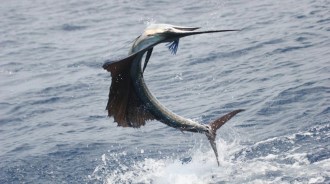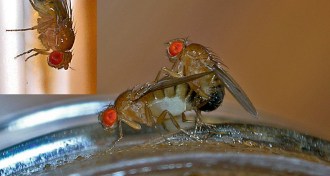Search Results for: Vertebrates
Skip to resultsCan’t find what you’re looking for? Visit our FAQ page.
1,543 results for: Vertebrates
-
 Animals
AnimalsFrustrated fish get feisty
Smaller rainbow trout become more aggressive towards bigger fish when they don’t their usual treats.
By Susan Milius -
 Animals
AnimalsSecrets of a sailfish attack
The large, long-nosed sailfish use their rostrums more like a sword than a spear to attack prey.
-
 Life
LifeRivalry helps fruit flies maintain brainpower
In lab tests, males dim mentally after generations without competitors.
By Susan Milius -
 Life
LifeWild snakes reproduce without sex
Virgin births are not just a by-product of captivity.
By Susan Milius -
 Life
LifeHind wings gave four-winged dino flight control
Much-debated rear wings could have given Microraptor extra help in airborne maneuvers.
By Susan Milius -
 Paleontology
PaleontologyEarliest primate had tree-climber ankles
A creature known only from fossils of its teeth gets some more parts.
By Susan Milius -
 Life
LifeRainforest katydids evolved mammal-like ears
Tiny hearing organs below insect’s knees have a structure similar to those in humans.
By Susan Milius -
 Earth
EarthGulf spill harmed small fish, studies indicate
Effects vary but dire impacts seen with some very low exposures.
By Janet Raloff -
 Health & Medicine
Health & MedicineSmoking hurts teen girls’ bones
Adolescents who use cigarettes seem to accumulate less bone mineral than those who don’t.
By Nathan Seppa -
 Life
LifeNews in brief: Fins to limbs with flip of genetic switch
Boost of gene activity may help explain how arms and legs evolved in vertebrates.
-
 Life
LifeVictorian zoological map redrawn
Species distribution patterns that inspired Darwin and Wallace get an update.
By Susan Milius -
 Life
LifeAncestors of today’s placental mammals may never have shared the Earth with dinosaurs
A newly constructed family tree dovetails with the fossil record, but differs considerably from previous genetic studies by suggesting that placental mammals emerged after the dinosaur extinction.
By Erin Wayman